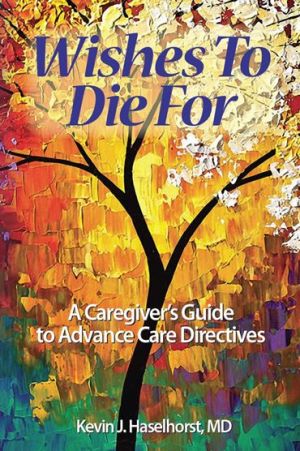Phoenix, Arizona - Patients often find it difficult to talk to physicians when they don't particularly feel well. They tend to lack self-respect in these situations, failing to speak up for themselves. Naturally, this sentiment reflects upon physicians who are seen as not treating patients with dignity. Dignity implies self-confidence and certainty, rarely afforded to patients. Patients are mostly discounted in the decision-making process because they are not asking the right questions at the right time.
Emergency Medicine physician, Kevin Haselhorst, author of the book Wishes To Die For, firmly believes that patients have to be more proactive in their life-and-death decisions by asking pertinent questions and becoming informed. He encourages people to complete advance care directives to alleviate undue suffering at the end of life. But most patients don't know what to wish for when life takes a turn for the worse since they rarely know what is being asked of them.
"The ultimate choice to live or die is not really just a medical decision," he says, "...it's a spiritual calling and one's healthcare directives need to become one's spiritual guidance documents to the living."
Dr. Haselhorst identifies ten important questions he recommends people carry with them when they go to the hospital or when they see their physicians. They are designed to help them ask the right questions, make the right decisions, and achieve the best outcomes. Here they are:
1. Is this test medical really necessary?
2. Can you feel and understand my pain?
3. How am I supposed to cope with the stress?
4. How can I be sure you are taking me seriously?
5. What am I to do next? What is the plan of action?
6. How old do you think I am? How old am I acting physically/mentally?
7. Do you want to see me again? When should I come back?
8. Am I dying? How long do I have to live?
9. What is the endpoint to my disease or illness? What is the final outcome of this process or treatment?
10. Can you offer me spiritual guidance please? Can you respect my wishes to die with dignity in my own way?
What are your wishes? Dr. Kevin Haselhorst has posed this question to his patients for years while practicing emergency medicine. Patients inevitably say, "You tell me. You're the doctor." Dr. H. has taken this task to heart while writing Wishes to Die For.
Empathy, being an inside journey, is the art of medicine that builds mutual respect between physicians, patients and family members. While Advance Care Directives (ACD's) are the voice for those who can no longer speak, Dr. Haselhorst offers impassioned words about the value of ACDs as a spiritual undertaking and declaration. Advance care planning as preventative medicine emboldens readers to eventually graduate from Alpha care to Omega care through traditional guidelines for higher education.
Wishes to Die For empowers patients and caregivers a better understanding of how to establish an individual and identifiable meaning and goal for dignity, visualize priorities and values being balanced with work and rest, experience life's trials and tribulations as the evolution of virtue and create a definitive finish line and realize lifetime achievement.
For more information, visit wishestodiefor.com.
About the Author
Kevin Haselhorst, MD practices emergency medicine at Abrazo Health in Arizona and is author of Wishes to Die For and Sail the 7 C's of Graceful Departures. His goal-directed therapy and practice has patients focus on their wishes and override their fear. He is a keynote speaker and contributing writer for the Arizona Republic's Ask the Expert Column and posts blogs on KevinMD, the Conversation Project and wishestodiefor.com.


